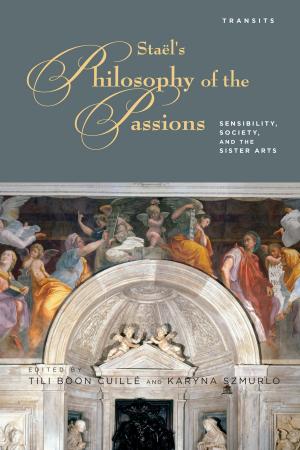Robert Burns in Global Culture
Fiction & Literature, Literary Theory & Criticism, Poetry History & Criticism, British| Author: | Murray Pittock, Robert Crawford, Leith Davis, Dominique Delmaire, R D. S. Jack, Nigel Leask, Pauline Anne Mackay, Clark McGinn, Silvia Mergenthal, Andrew Monnickendam, Alan Rawes, Frauke Reitemeier, Christopher A. Whatley | ISBN: | 9781611480313 |
| Publisher: | Bucknell University Press | Publication: | May 19, 2011 |
| Imprint: | Bucknell University Press | Language: | English |
| Author: | Murray Pittock, Robert Crawford, Leith Davis, Dominique Delmaire, R D. S. Jack, Nigel Leask, Pauline Anne Mackay, Clark McGinn, Silvia Mergenthal, Andrew Monnickendam, Alan Rawes, Frauke Reitemeier, Christopher A. Whatley |
| ISBN: | 9781611480313 |
| Publisher: | Bucknell University Press |
| Publication: | May 19, 2011 |
| Imprint: | Bucknell University Press |
| Language: | English |
Robert Burns has been a key figure in Scottish identity globally since his death in 1796. But he has always been much more than that. In America, his admirers have included Emerson, President Lincoln, Maya Angelou and many others, for Burns was long held to be a friend to the American way of life, an opponent of kings and tyranny, and someone who proved that the values that built the United States were not extinct in Europe. In Europe itself, Burns was seen as both an authentic voice of the people-a representative of their way of life-and a progressive, informed and radical writer. In the British Empire and later the Commonwealth, he was a symbol of Scottish nationality and sociability abroad. In more recent times he has been seen as a poet of universal brotherhood and sisterhood. It takes a great poet to be all things to all people, and to be interpreted so variously worldwide. One of the extraordinary things about Burns is that while his books were sold globally, while he remains the second most translated Scottish author of all time, and when even the USSR issued a stamp in his honour, the postwar academic world turned away from a poet whom it had previously recognized as a major figure. Burns disappeared from accounts of Romanticism, and such meagre helpings of critical attention as he received were often directed towards his supposed status as a labouring class or dialect poet, a status which is completely at odds with Burns' sophisticated control of register. Robert Burns in Global Culture is an ambitious book. Drawing on the work of leading experts from Scotland, England, North America, France, Germany and Spain, it analyses the reasons for Burns' critical decline, examines the phenomenon of Burns' global influence on areas from Italian politics to American identity, and places Burns' influence, reputation and unique qualites as a poet within a framework of reference which blends rigorous intellectual enquiry into the poet and his poetry with analyses of popular culture, from Burns Suppers to Burns statues. Robert Burns is a writer who incorporates magnificent and memorable poetry with widespread popular recognition at thousands of annual events held in his memory. Such a writer is rare and deserves our full consideration. Popular remembrance and academic amnesia has been the fate of Burns since 1945. If we want to make the humanities relevant-to make the Arts part of every question-we cannot afford academic detachment and neglect from a writer still so relevant to the world outside the academy and to us all, not least in a world where still 'Man's inhumanity to man/Makes countless thousands mourn'. Robert Burns is the great poet of humanity against inhumanity, sympathy against power, love against control. He is Robert Burns in Global Culture.
Robert Burns has been a key figure in Scottish identity globally since his death in 1796. But he has always been much more than that. In America, his admirers have included Emerson, President Lincoln, Maya Angelou and many others, for Burns was long held to be a friend to the American way of life, an opponent of kings and tyranny, and someone who proved that the values that built the United States were not extinct in Europe. In Europe itself, Burns was seen as both an authentic voice of the people-a representative of their way of life-and a progressive, informed and radical writer. In the British Empire and later the Commonwealth, he was a symbol of Scottish nationality and sociability abroad. In more recent times he has been seen as a poet of universal brotherhood and sisterhood. It takes a great poet to be all things to all people, and to be interpreted so variously worldwide. One of the extraordinary things about Burns is that while his books were sold globally, while he remains the second most translated Scottish author of all time, and when even the USSR issued a stamp in his honour, the postwar academic world turned away from a poet whom it had previously recognized as a major figure. Burns disappeared from accounts of Romanticism, and such meagre helpings of critical attention as he received were often directed towards his supposed status as a labouring class or dialect poet, a status which is completely at odds with Burns' sophisticated control of register. Robert Burns in Global Culture is an ambitious book. Drawing on the work of leading experts from Scotland, England, North America, France, Germany and Spain, it analyses the reasons for Burns' critical decline, examines the phenomenon of Burns' global influence on areas from Italian politics to American identity, and places Burns' influence, reputation and unique qualites as a poet within a framework of reference which blends rigorous intellectual enquiry into the poet and his poetry with analyses of popular culture, from Burns Suppers to Burns statues. Robert Burns is a writer who incorporates magnificent and memorable poetry with widespread popular recognition at thousands of annual events held in his memory. Such a writer is rare and deserves our full consideration. Popular remembrance and academic amnesia has been the fate of Burns since 1945. If we want to make the humanities relevant-to make the Arts part of every question-we cannot afford academic detachment and neglect from a writer still so relevant to the world outside the academy and to us all, not least in a world where still 'Man's inhumanity to man/Makes countless thousands mourn'. Robert Burns is the great poet of humanity against inhumanity, sympathy against power, love against control. He is Robert Burns in Global Culture.















